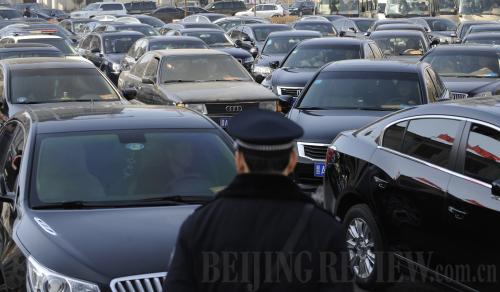|
 |
|
OFFICIAL WAVE: Official cars pour out of a parking lot after a municipal government meeting in Taiyuan, north China's Shanxi Province, on January 25 (CFP) |
Guangzhou, capital of south China's Guangdong Province, will further reform the use of official cars as part of its efforts to alleviate traffic jams, said the city's traffic authorities on January 23.
The Guangzhou Municipal Commission of Transport is soliciting public opinions regarding measures it has proposed to ease congestion. The deadline for proposal submissions is March 5.
Official cars refer to ones used by government agencies, organs of the Communist Party of China (CPC), public service institutions, the military and state-owned enterprises.
According to statistics from the Ministry of Finance, the National Development and Reform Commission (NDRC) and the National Bureau of Statistics, government agencies at all levels have registered more than 2 million cars, which cost 150 billion yuan ($23.89 billion) to 200 billion yuan ($29.28 billion) each year.
The large number of official cars contributed to the cities' traffic jams and the government's unnecessary expenditure, said Wang Yukai, a professor with the Chinese Academy of Governance.
Easing pressure
In order to solve congestion problems, Beijing, with 20 million people and 4.8 million vehicles, has imposed tough congestion-tackling measures, including reducing the number of new car license plates this year to 240,000, a third the number in 2010.
It's also stipulated no municipal government office in Beijing is allowed to purchase new cars for the next five years.
"The impacts of official cars on Beijing's traffic cannot be ignored," Wang said.
According to national broadcaster CCTV, there are more than 700,000 official cars in Beijing, accounting for 15 percent of its total vehicles on road.
In Guangzhou, the situation is just the same.
Conservative estimates put the number of official cars in Guangzhou at nearly 200,000.
"An excessive number of official vehicles are on Guangzhou's roads," said Guangdong Governor Huang Huahua.
"In the past, only Party and government officials above the vice-ministerial level were allowed to use exclusive cars," he said. "But now, many township officials, or lower, have exclusive official cars. Many retired officials still use official cars, too,"
Huang said the excessive number of official cars had proven problematic.
The Central Government had issued a regulation banning retired officials lower than vice governor from using exclusive publicly-funded cars, and Guangdong would soon issue a similar policy nullifying the privilege for retired vice governors and lower officials, he said.
Huang said relevant departments will further improve official car management.
For a long time, China's official vehicle management system has been criticized for wasting public resources, including traffic resources.
"It's time for the government to reform its system of managing and using official cars," said Professor Wang.
According to the NDRC, it is studying issues concerning the use of publicly funded cars and plans to further reform rules for the use of the cars. The study is conducted in response to a proposal by a democratic party on curbing the misuse of official cars.
In March last year, the Central Committee of the Revolutionary Committee of the Chinese Kuomintang (RCCK), one of China's eight democratic parties, submitted a proposal at the annual session of the National Committee of the Chinese People's Political Consultative Conference (CPPCC), the country's top political advisory body, on reforming the use of official cars.
Reliable statistics show a single government car can cost up to 60,000 yuan ($8,785) a year, amounting to more than 100,000 yuan ($14,641) a year in some cases, according to the RCCK Central Committee's proposal.
The proposal calls for canceling official cars for officials below the bureau level and formulating a mechanism for recording and supervising the use of official cars.
It also suggests government agencies rent cars from taxi companies instead and subsidize civil servants who are not allocated the use of an official car.
In reply to the proposal, the NDRC said China was ready for the reform in accordance with the development of its economy, improved social transportation services and increase of private cars.
While there have been earlier efforts to reform the use of official cars, most of them have not been successful.
"The previous reforms made little progress," said Pang Jianguo, an official with the Beijing Municipal Bureau of Supervision.
"The effectiveness of the forthcoming reform is hard to predict and giving subsidies to civil servants will put public finances under pressure," he said.
"Pervious reforms were stranded partly because the country has no specific disciplinary procedures regarding the misuse of official cars," the RCCK Central Committee says in an article on its official website, in which it suggests setting up legislation to improve the feasibility of the reform process.
"The deadlock of the reform lies in the vested interest groups, who are both beneficiaries of official cars and decision-makers in the reform," Wang said.
| 